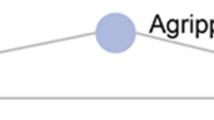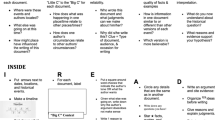Abstract
This case study examines the benefits of integrating wikis into the World History curriculum. Six middle school students chosen because of their designation in relevant subgroups—GATE, AVID, and RSP—participated in this 20-week study. Abstract historical concepts can be difficult to grasp; therefore, students collaborated via a wiki on topics that required students to practice historical analysis skills that are utilized by historians and social scientists who are experts in their field. Historical and social science analysis skills add rigor to the curriculum as students develop a deeper understanding of historical events beyond the core curriculum. Findings indicate that students, when given the option, chose to use higher order thinking skills. The high number of responses by the RSP students was a surprising outcome. The data indicates that wikis foster collaborative learning, interaction, and natural student inquiry.
Similar content being viewed by others
References
Barbour, M., & Rich, P. (2007). Social constructivist e-learning: A case study. International Electronic Journal for Leadership in Learning, 11.
Bennett, L., & Pye, J. (1999). Instructional technology as a medium for learning world history. International Journal of Social Education, 14(1), 111–117.
Bloom B. S. (1956). Taxonomy of Educational Objectives, Handbook I: The Cognitive Domain. New York: David McKay Co Inc.
California Department of Education (1998). History-social science content standards for California public schools: Kindergarten through grade twelve. Retrieved from http://www.cde.ca.gov/be/ st/ss/documents/histsocscistnd.pdf
Churchill, D. (2009). Educational applications of web 2.0: Using blogs to support teaching and learning. British Journal of Educational Technology, 40(1), 179–183.
Dils, A. K. (2000). Using technology in a middle school social studies classroom. International Journal of Social Education, 15(1), 101–112.
Dodge, J. (2006). Differentiation in Action. New York: Scholastic, Incorporated.
Dutt-Doner, K., Cook-Cottone, C., & Allen, S. (2007). Improving classroom instruction: Understanding the developmental nature of analyzing primary sources. Research in Middle Level Education Online, 30(6), 1-12.
Friedman, A. M., & Heafner, T. L. (2007). You think for me, so I don’t have to. Contemporary Issues in Technology and Teacher Education, 7, 199–216.
Gregory, G. H., & Chapman, C. (2002). Differentiated instructional strategies: One size doesn’t fit all. Thousand Oaks, California: Corwin Press, Incorporated.
Heafner, T. L., & Friedman, A. M. (2008). Wikis and constructivism in secondary social studies: Fostering a deeper understanding. Computers in Schools, 25(3–4), 288–302. doi:10.1080/07380560802371003
Hernandez-Ramos, P., & De La Paz, S. (2009). Learning history in middle school by designing multimedia in a project-based learning experience. Journal of Research on Technology in Education, 42(2), 151-173.
Jonassen, D., Howland, J., Marra, R. M., & Crismond, D. (2008). Meaningful learning with technology (3rd ed.). Upper Saddle River, New Jersey: Pearson Education.
Kaplan, S. (2006). Think like a disciplinarian. In Theory and practice: Curriculum and instruction for educators. Retrieved from http://www-bcf.usc.edu/~skaplan/discpline.html
Kelly, T. M. (2008). The role of technology in world history teaching. World History Connected, 3(3). Retrieved from http://worldhistoryconnected.press.illinois.edu/3.3/kelly.html
Kissel, B., Hathaway, J. I., & Wood, K. D. (2010). Digital collaborative literacy: Using wikis to promote social learning and literacy development. Middle School Journal, 41(5), 58.
Lamb, A., & Johnson, L. (2009). Wikis and collaborative inquiry. School Library Media Activities Monthly, 25, 48–51.
Larson, L. C. (2009). Reader response meets new literacies: Empowering readers in online learning communities. The Reading Teacher, 62(8), 638–648. doi:10.1598/RT.62.8.2
Larusson, J. A. & Alterman, R. (2009). Wikis to support the “collaborative” part of collaborative learning. Computer-Supported Collaborative Learning, 4, 371–402. doi:10.1007/s11412-009-9076-6
Lin, H., & Kelsey, K. D. (2009). Building a networked environment in wikis: The evolving phases of collaborative learning in a wikibook project. Journal of Educational Computing Research, 40(2), 145–169.
López, M., & Jordine, M. (2008). A practical compromise to teaching world history: Thematic bridges, standards, and technology. World History Connected, 5(3).
Morgan, B., & Smith, R. D. (2008). Technology in literary education: A wiki for classroom writing. The Reading Teacher, 62(1), 80–82.
Nakamaru, S. (2012). Investment and return: Wiki engagement in a “remedial” ESL writing course. Journal of Research on Technology in Education, 44(4), 273-2R91.
National Council for the Social Studies. (2008). Curriculum guidelines for social studies teaching and learning. Retrieved from http://www.socialstudies.org/positionstatements
North Central Regional Educational Library. (2005). Critical issue: Using technology to improve student achievement. Retrieved from http://www.ncrel.org/sdrs/areas/issues/methods/technlgy/te800.htm
Ormrod, J. E. (2008). Educational Psychology: Developing Learners (6th ed.). Upper Saddle River, New Jersey: Pearson Education.
Persell, C. H. (2004). Using focused web-based discussions to enhance student engagement and deep understanding. Teaching Sociology, 32(1), 61–78.
Ramaswami, R. (2008). The prose (and a few cons, too) of blogging. T.H.E. Journal, 35. Retrieved from http://thejournal.com/Articles/2008/11/01/The-Prose-of-Blogging-and-a-Few-Cons-Too.aspx
Rice, M. L., Wilson, E. K., & Bagley, W. (2001). Transforming learning with technology: Lessons from the field. Journal of Technology and Teacher Education, 9(2), 211-230.
Sheets, K. B. (2009). Wiki in the history classroom: Can joint-authoring technology help students understand the nature of the historian’s craft? Perspectives on History, 47(5), 52–54.
Simonson, M., Smaldino, S., Albright, M., & Zvacek, S. (2009). Teaching and learning at a distance: Foundations of distance education. Boston, Massachusetts: Pearson Education.
Solvie, P., & Kloek, M. (2007). Using technology tools to engage students with multiple learning styles in a constructivist learning environment. Contemporary Issues in Technology and Teacher Education, 7(2), 7–27.
Tally, B., & Goldenberg, L. B. (2005). Fostering historical thinking with digitized primary sources. Journal of Research on Technology in Education, 38(1), 1–21.
Taylor, J. A., & Duran, M. (2006). Teaching social studies with technology: New research on collaborative approaches. The History Teacher, 40(1), 9–25.
Thomas, P., King, D., & Minocha, S. (2009). The effective use of a simple wiki to support collaborative learning activities. Computer Science Education, 19(4), 293-313.
Wellman, E., & Flores, J. (2002). Online discourse: expansive possibilities in the history classroom (Report IR-021-916). Retrieved from ERIC database. (ED475955)
Wineburg, S. S. (1991). On the reading of historical texts: Notes on the breach between school and academy. American Educational Research Journal, 28(3), 495-519.
Xiao, L., & Carroll, J. M. (2007). Fostering an informal learning community of computer technologies at school. Behaviour and Information Technology, 26(1), 23-36.
Zukas, A. (2000). Active learning, world history, and the internet: Creating knowledge in the classroom. International Journal of Social Education, 15(1), 62–79.
Author information
Authors and Affiliations
Rights and permissions
About this article
Cite this article
Cabiness, C., Donovan, L. & Green, T.D. Integrating Wikis in the Support and Practice of Historical Analysis Skills. TECHTRENDS TECH TRENDS 57, 38–48 (2013). https://doi.org/10.1007/s11528-013-0700-y
Published:
Issue Date:
DOI: https://doi.org/10.1007/s11528-013-0700-y




